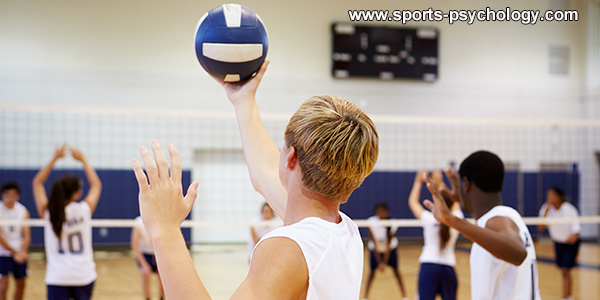Staying Motivated During Volleyball Practice
Summary: In volleyball, not every practice will come with high energy or the perfect coaching approach. Great players learn to bring their own positive mindset, set practice goals, and find ways to improve even in tough situations. Whether it’s sharpening individual skills when the coach focuses elsewhere or using adversity to build resilience, athletes gain strength by controlling what they can.
As a volleyball player, especially if you’re a young player, you go to practice and rely a lot on a coach to bring good vibes, positive energy, and to work with you on your game.
That’s how it is in a perfect world… Though, no one lives in a perfect world…
As an athlete, sometimes you have to look to yourself for the good vibes, the positive energy, and skill work during practice. This can be frustrating of course, because as humans we feed off one another.
However, you strengthen your game when you commit to bringing your own atmosphere.
You may have a coach who’s negative or who works with certain positions on their skills more than other positions.
As a player, you might wonder how to get through a practice with these challenges. Instead of seeing them as something bad, take advantage of this opportunity.
For example, if you’re a DS and your coach works a lot with hitting, plan to do ball control work on the side or step in and work on your defense while the hitters swing.
Or if your coach gives off negative energy, use this time to challenge your ability to persevere through distractions and adversity.
Your thoughts about a situation change when your perception of the situation changes.
Russ Rose, the head volleyball coach at Penn State University ranks first with his coaching record in NCAA Division 1 history. He also has a unique coaching style…
During games, he sits the majority of the time and he could go through a practice with few words spoken. Yet, he continues to have one of the top programs in the country year after year.
Under his guidance, Rose’s players recognize their own ability to influence the practice energy and to work on their individual game during practice.
If you want to work through negative energy at practice or a coaching style that doesn’t correlate with you, set practice objectives or goals, commit to your practice plan, and use positive self-talk for inspiration.
For instance, work on your technique with each ball, plan and commit to keeping your energy high even when discouraged and tell yourself “next ball” to keep you moving.
Worry only about what you can control; things like your preparation and your energy.
5 Tips for Handling Negative Energy in Volleyball Practice
1. Bring Your Own Positive Energy
Don’t rely solely on your coach for motivation. Commit to creating your own atmosphere of good vibes, focus, and determination during practice.
2. Turn Challenges into Opportunities
If your coach spends more time with hitters, use the chance to sharpen your ball control, defense, or passing skills on the side.
3. Practice Mental Resilience
Negative energy in the gym is a chance to build perseverance. Treat it as mental training that strengthens your ability to play under pressure.
4. Learn From Elite Examples
Russ Rose, Penn State’s legendary coach, often said little in practice, yet his players thrived. His athletes learned to generate their own energy and accountability, which fueled championship-level success.
5. Focus on What You Can Control
Instead of worrying about your coach’s energy or approach, lock in on your preparation, effort, and mindset. Use positive self-talk like “next ball” to keep momentum moving forward.
If you have not taken our survey yet, please give us two minutes of your time so we can learn about your challenges in volleyball:
Related Sports Psychology Articles:
- Focusing on The Positives of Your Performance
- How to Develop a Positive Mindset in Sports
- Developing Positive Practice Habits
Free Mental Toughness Reports

Get instant access to a mental game report to improve your mental toughness. Are you making one or more of these “deadly” mental game mistakes prior to competition? You can improve your mental game with one of our free sports-specific reports below.
with our free mental toughness reports, you’ll:
- Discover if you have positive or negative pregame jitters.
- Identify your pre-competition mental game mistakes.
- Learn the important pregame mental skills to boost your performance and success!
Learn how mental game strategies can boost your mental toughness in sports with Dr. Cohn’s free mental game reports!
FAQ: Handling Negative Energy in Volleyball Practice
Q: How can I stay positive if my coach is negative in practice?
A: Use it as an opportunity to train your mental toughness. Remind yourself that you control your effort, energy, and focus—not your coach’s attitude.
Q: What should I do if my coach focuses more on other positions?
A: Create your own practice objectives. For example, if hitters get most of the attention, work on passing, defense, or serving drills during that time.
Q: How does mindset impact practice performance?
A: Your mindset determines how you respond to challenges. A positive, solution-focused outlook keeps confidence high and helps you improve regardless of circumstances.
Q: Can practicing self-talk actually improve performance?
A: Yes—short cues like “next ball” or “stay ready” refocus your mind, reduce frustration, and keep your energy consistent throughout practice.
Q: Why is focusing on what you can control so important in volleyball?
A: Worrying about things outside your control—like a coach’s style or negative energy—drains focus. By controlling your preparation and attitude, you maximize growth and performance.
Dr. Patrick Cohn is an expert mental performance coach who has helped athletes for over 30 years enhance their performance. Dr. Cohn earned a master’s degree in sports psychology from CSUF and a Ph.D. from the University of Virginia, specializing in Applied Sports Psychology.

